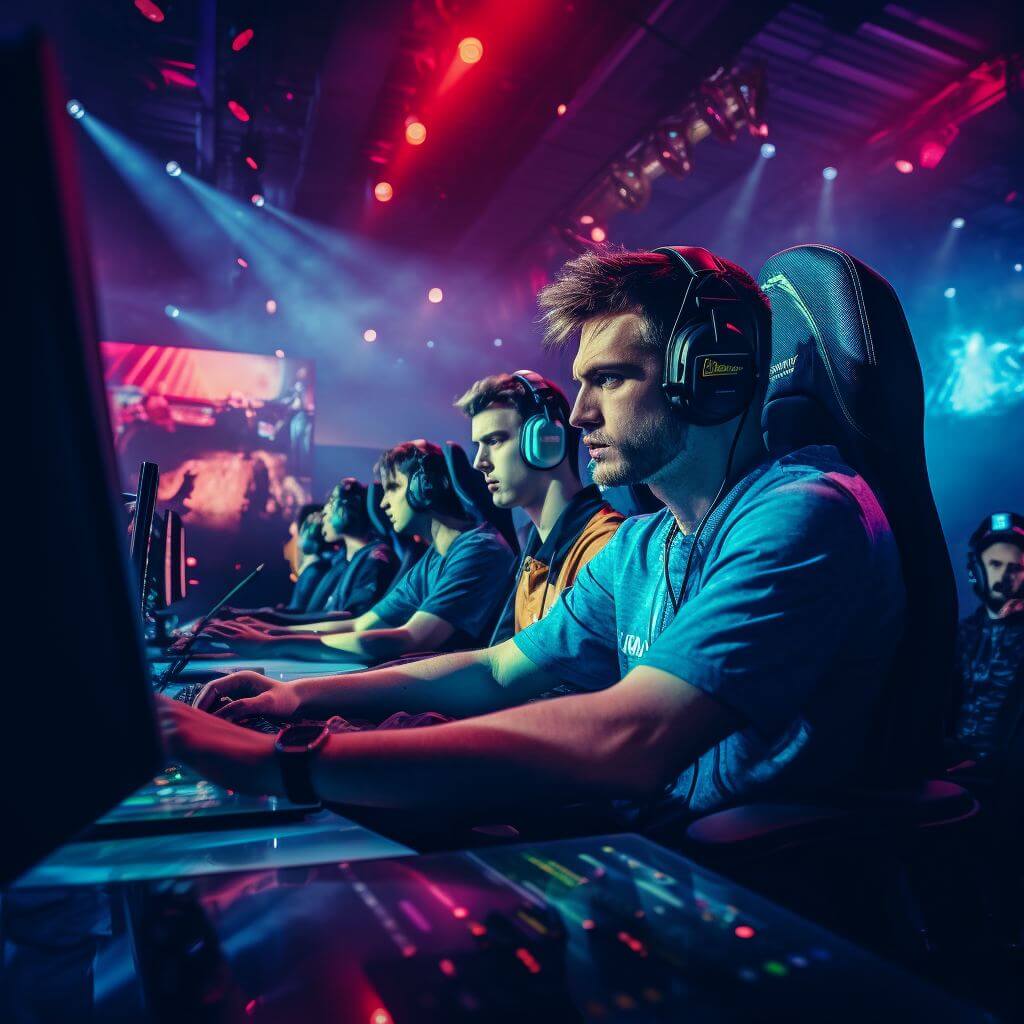Esports, the competitive world of video gaming, has undergone a transformative journey, evolving from a casual pastime into a multi-billion-dollar industry. Major media networks and traditional sports leagues have eagerly embraced Esports, recognizing its immense potential. Moreover, educational institutions have joined the fray, with over 600 colleges and high schools offering varsity teams and scholarships for Esports enthusiasts.
This meteoric rise can be attributed to the unquenchable thirst for competition and the dream of turning gaming into a lucrative profession. With 83% of teenage girls and 95% of teenage boys regularly engaging in video games, the allure of becoming a professional gamer is undeniable. Esports events now offer staggering cash prizes, with some tournaments boasting prize pools of tens of millions of dollars. The competition is fierce, but the rewards are substantial.
The growth of Esports
Since its humble beginnings in the 1990s, Esports has emerged as a cultural and economic force to be reckoned with. What started as casual gaming competitions among friends has evolved into a billion-dollar industry. In the early days, the winner of the first Esports event walked away with a yearlong subscription to Rolling Stone magazine. Today, we witness championships offering prize pools that can reach tens of millions of dollars, an astonishing testament to the industry’s growth.
Year after year, Esports experiences remarkable growth. The industry’s financial trajectory is nothing short of astounding, nearing the coveted $1 billion mark. Viewership numbers are equally impressive, with live Esports events captivating tens of millions of global spectators. This phenomenal rise in popularity has attracted not only dedicated gamers but also major media networks, traditional sports leagues, and even owners of NBA and NFL teams. It’s a modern-day gold rush, and Esports is at the forefront.
Esports is no longer just a niche subculture; it’s on the cusp of gaining recognition on the world’s grandest sporting stage—the Olympics. The potential inclusion of Esports in the Olympics underscores its mainstream acceptance and importance. The global audience and the competitive spirit of Esports align perfectly with the Olympic ideals, signaling a significant shift in the perception of video gaming as a legitimate sport.
Accessibility and streaming
One of Esports’ unique strengths lies in its accessibility. Unlike traditional sports, which often require the physical presence of participants, Esports transcends geographical boundaries. Gamers can engage in global competition with nothing more than an internet connection, all from the comfort of their homes. This accessibility has democratized competitive gaming, enabling anyone with a passion for gaming to participate and compete at the highest levels.
Streaming platforms like Twitch, owned by Amazon, have played a pivotal role in propelling Esports into the mainstream. In 2017, Twitch drew a staggering 15 million daily visitors who collectively watched a mind-boggling 355 billion minutes of content. These platforms provide a direct link between professional gamers and their global fan base, fostering a vibrant community of enthusiasts who can watch, learn from, and interact with their favorite players in real-time.
Twitch’s influence on Esports cannot be overstated. Its seamless live streaming capabilities have turned gamers into celebrities, their gameplay sessions transformed into highly engaging content. Esports enthusiasts worldwide gather on platforms like Twitch to witness their idols in action, learn advanced strategies, and connect with like-minded individuals. This symbiotic relationship between gamers and viewers has become a cornerstone of Esports’ success.
Esports careers: Going pro
For countless aspiring gamers, the dream of going pro is the ultimate aspiration. In a world where 83% of teenage girls and 95% of teenage boys regularly play video games, the allure of earning a living as a professional gamer is undeniable. This dream promises an alternative to traditional careers like accounting, law, or sales, offering a path where passion and play converge.
Becoming a professional gamer is no easy feat. The Esports landscape is fiercely competitive, with hundreds of millions of gamers vying for a limited number of spots. Take, for instance, the 2019 Fortnite World Cup, where one teenager secured a jaw-dropping $3 million in prize money. However, this grand prize was claimed by only a hundred out of over 40 million competitors. The odds are undeniably challenging, making it clear that succeeding in Esports requires exceptional skill, dedication, and a touch of luck.
The Fortnite World Cup serves as a poignant example of Esports’ high stakes. With a massive pool of participants and immense financial rewards, it epitomizes the tantalizing yet daunting journey that awaits aspiring pro gamers. While the headline-grabbing payouts are real, they are the exception rather than the rule in the competitive world of Esports.
The best Esports teams
Esports is not just about individual prowess; it’s also about exceptional team dynamics. The best Esports teams have carved their names into the annals of competitive gaming history. Ranked based on total earnings across all games, these teams are a force to be reckoned with.
At the top of the Esports pyramid stands Team Liquid, a behemoth in the gaming world with earnings totaling an impressive $33.8 million. They’ve participated in a staggering 1622 tournaments, proving their consistent excellence. Their highest-earning game is DOTA 2, where they’ve demonstrated exceptional skill and strategy.
These Esports teams are more than just competitors; they’re cultural phenomena. With tens of millions of devoted followers across various platforms, they’ve built a cult-like following. They’ve harnessed their popularity to become content-creation machines, engaging with their massive fan base in ways that extend far beyond the competitive arena. Faze Clan, for instance, has seen their valuation surge to an estimated $35 million in 2019, primarily through content creation and fan engagement.
Esports earnings vs. traditional sports
Comparing Esports earnings to those in traditional sports is illuminating. In 2019, Tiger Woods won the prestigious Masters tournament in golf, walking away with $3 million—a remarkable achievement in a sport with centuries of history. Contrast this with ‘Bugha,’ a 16-year-old who clinched the Fortnite World Championship in the same year, earning the same $3 million. What sets this achievement apart is that Fortnite, the game that facilitated Bugha’s triumph, was created only in 2017.
This comparison underscores the rapid ascent of Esports. In just a few years, it has become a lucrative career path, rivaling or even surpassing traditional sports in terms of earnings. The accessibility and appeal of Esports have created a new realm of possibilities for gamers, with substantial rewards awaiting those who can excel in this dynamic and competitive arena.
Esports health and addiction concerns
While Esports offers remarkable opportunities, it’s not without its concerns. Professional gamers often spend hours each day honing their skills, and this sedentary lifestyle can lead to health issues. Studies have shown that Esports athletes are prone to musculoskeletal injuries in their neck, back, and upper extremities due to prolonged hours of gaming in a suboptimal posture. Additionally, metabolic disturbances may arise from extensive screen time.
Beyond physical health, gaming addiction and mental health concerns loom large. The addictive nature of gaming can lead to excessive screen time, impacting social interactions and overall well-being. Esports players, driven by their desire to excel, may neglect their mental health, leading to stress and social behavior disorders.
Recognizing these concerns is vital for both players and the Esports industry as a whole. While it’s important to pursue one’s dreams, it’s equally crucial to maintain a balanced approach. Most collegiate Esports programs emphasize this balance by providing a structured environment with coaches, trainers, and advisors. This ensures that gamers can pursue their passion while safeguarding their mental and physical health.
Conclusion
In a span of just a few decades, Esports has morphed from a niche hobby into a global juggernaut. Its unprecedented growth and impact have left an indelible mark on the world of entertainment and competition. From modest beginnings to a soon-to-be billion-dollar industry, Esports now enjoys recognition and acclaim on par with traditional sports.
With great power comes great responsibility. Aspiring gamers are urged to pursue their Esports dreams with eyes wide open. The path to professional gaming is fraught with challenges, and success is far from guaranteed. It demands not only dedication and skill but also a keen awareness of health and addiction concerns. Responsible gaming is the linchpin of a sustainable Esports journey.





